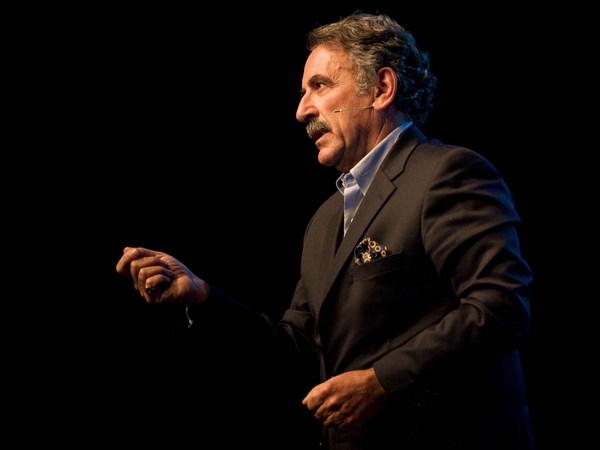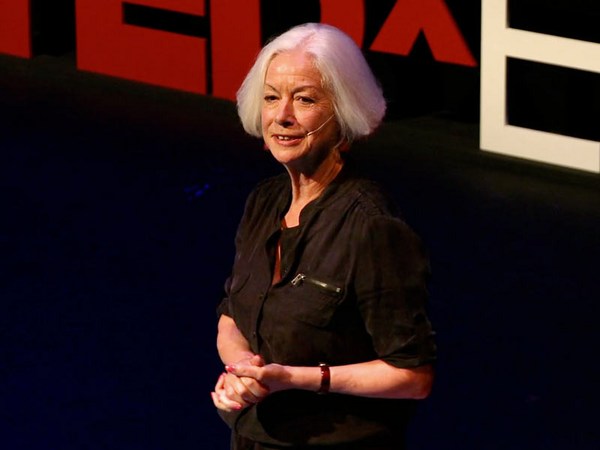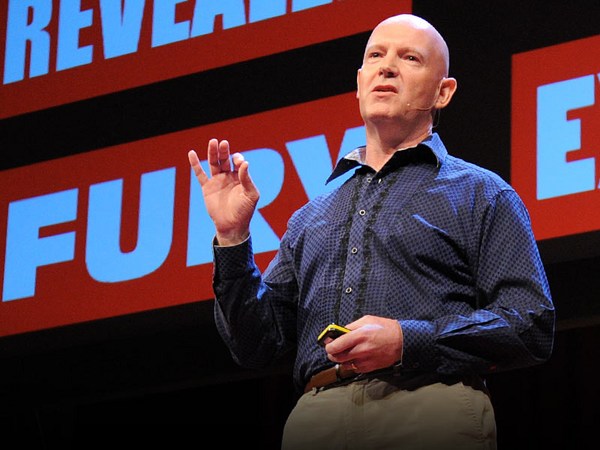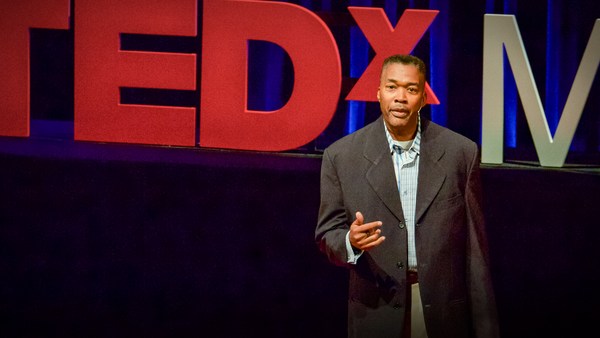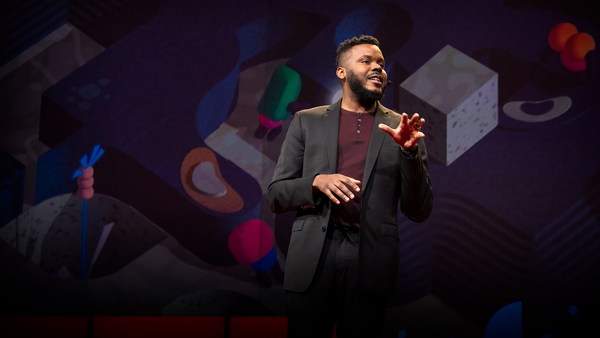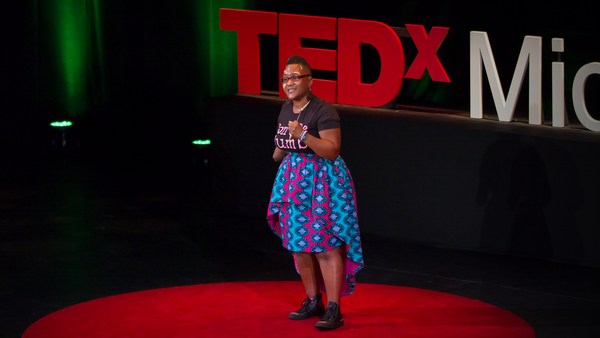I've learned some of my most important life lessons from drug dealers and gang members and prostitutes, and I've had some of my most profound theological conversations not in the hallowed halls of a seminary but on a street corner on a Friday night, at 1 a.m.
That's a little unusual, since I am a Baptist minister, seminary-trained, and pastored a church for over 20 years, but it's true. It came as a part of my participation in a public safety crime reduction strategy that saw a 79 percent reduction in violent crime over an eight-year period in a major city.
But I didn't start out wanting to be a part of somebody's crime reduction strategy. I was 25, had my first church. If you would have asked me what my ambition was, I would have told you I wanted to be a megachurch pastor. I wanted a 15-, 20,000-member church. I wanted my own television ministry. I wanted my own clothing line. (Laughter) I wanted to be your long distance carrier. You know, the whole nine yards. (Laughter)
After about a year of pastoring, my membership went up about 20 members. So megachurchdom was way down the road. But seriously, if you'd have said, "What is your ambition?" I would have said just to be a good pastor, to be able to be with people through all the passages of life, to preach messages that would have an everyday meaning for folks, and in the African-American tradition, to be able to represent the community that I serve.
But there was something else that was happening in my city and in the entire metro area, and in most metro areas in the United States, and that was the homicide rate started to rise precipitously. And there were young people who were killing each other for reasons that I thought were very trivial, like bumping into someone in a high school hallway, and then after school, shooting the person. Someone with the wrong color shirt on, on the wrong street corner at the wrong time. And something needed to be done about that. It got to the point where it started to change the character of the city. You could go to any housing project, for example, like the one that was down the street from my church, and you would walk in, and it would be like a ghost town, because the parents wouldn't allow their kids to come out and play, even in the summertime, because of the violence. You would listen in the neighborhoods on any given night, and to the untrained ear, it sounded like fireworks, but it was gunfire. You'd hear it almost every night, when you were cooking dinner, telling your child a bedtime story, or just watching TV. And you can go to any emergency room at any hospital, and you would see lying on gurneys young black and Latino men shot and dying. And I was doing funerals, but not of the venerated matriarchs and patriarchs who'd lived a long life and there's a lot to say. I was doing funerals of 18-year-olds, 17-year-olds, and 16-year-olds, and I was standing in a church or at a funeral home struggling to say something that would make some meaningful impact. And so while my colleagues were building these cathedrals great and tall and buying property outside of the city and moving their congregations out so that they could create or recreate their cities of God, the social structures in the inner cities were sagging under the weight of all of this violence.
And so I stayed, because somebody needed to do something, and so I had looked at what I had and moved on that. I started to preach decrying the violence in the community. And I started to look at the programming in my church, and I started to build programs that would catch the at-risk youth, those who were on the fence to the violence. I even tried to be innovative in my preaching. You all have heard of rap music, right? Rap music? I even tried to rap sermon one time. It didn't work, but at least I tried it. I'll never forget the young person who came to me after that sermon. He waited until everybody was gone, and he said, "Rev, rap sermon, huh?" And I was like, "Yeah, what do you think?" And he said, "Don't do that again, Rev." (Laughter)
But I preached and I built these programs, and I thought maybe if my colleagues did the same that it would make a difference. But the violence just careened out of control, and people who were not involved in the violence were getting shot and killed: somebody going to buy a pack of cigarettes at a convenience store, or someone who was sitting at a bus stop just waiting for a bus, or kids who were playing in the park, oblivious to the violence on the other side of the park, but it coming and visiting them. Things were out of control, and I didn't know what to do, and then something happened that changed everything for me. It was a kid by the name of Jesse McKie, walking home with his friend Rigoberto Carrion to the housing project down the street from my church. They met up with a group of youth who were from a gang in Dorchester, and they were killed. But as Jesse was running from the scene mortally wounded, he was running in the direction of my church, and he died some 100, 150 yards away. If he would have gotten to the church, it wouldn't have made a difference, because the lights were out; nobody was home. And I took that as a sign. When they caught some of the youth that had done this deed, to my surprise, they were around my age, but the gulf that was between us was vast. It was like we were in two completely different worlds.
And so as I contemplated all of this and looked at what was happening, I suddenly realized that there was a paradox that was emerging inside of me, and the paradox was this: in all of those sermons that I preached decrying the violence, I was also talking about building community, but I suddenly realized that there was a certain segment of the population that I was not including in my definition of community. And so the paradox was this: If I really wanted the community that I was preaching for, I needed to reach out and embrace this group that I had cut out of my definition. Which meant not about building programs to catch those who were on the fences of violence, but to reach out and to embrace those who were committing the acts of violence, the gang bangers, the drug dealers.
As soon as I came to that realization, a quick question came to my mind. Why me? I mean, isn't this a law enforcement issue? This is why we have the police, right? As soon as the question, "Why me?" came, the answer came just as quickly: Why me? Because I'm the one who can't sleep at night thinking about it. Because I'm the one looking around saying somebody needs to do something about this, and I'm starting to realize that that someone is me. I mean, isn't that how movements start anyway? They don't start with a grand convention and people coming together and then walking in lockstep with a statement. But it starts with just a few, or maybe just one.
It started with me that way, and so I decided to figure out the culture of violence in which these young people who were committing them existed, and I started to volunteer at the high school. After about two weeks of volunteering at the high school, I realized that the youth that I was trying to reach, they weren't going to high school. I started to walk in the community, and it didn't take a rocket scientist to realize that they weren't out during the day. So I started to walk the streets at night, late at night, going into the parks where they were, building the relationship that was necessary.
A tragedy happened in Boston that brought a number of clergy together, and there was a small cadre of us who came to the realization that we had to come out of the four walls of our sanctuary and meet the youth where they were, and not try to figure out how to bring them in. And so we decided to walk together, and we would get together in one of the most dangerous neighborhoods in the city on a Friday night and on a Saturday night at 10 p.m., and we would walk until 2 or 3 in the morning. I imagine we were quite the anomaly when we first started walking. I mean, we weren't drug dealers. We weren't drug customers. We weren't the police. Some of us would have collars on. It was probably a really odd thing. But they started speaking to us after a while, and what we found out is that while we were walking, they were watching us, and they wanted to make sure of a couple of things: that number one, we were going to be consistent in our behavior, that we would keep coming out there; and then secondly, they had wanted to make sure that we weren't out there to exploit them. Because there was always somebody who would say, "We're going to take back the streets," but they would always seem to have a television camera with them, or a reporter, and they would enhance their own reputation to the detriment of those on the streets. So when they saw that we had none of that, they decided to talk to us. And then we did an amazing thing for preachers. We decided to listen and not preach. Come on, give it up for me. (Laughter) (Applause) All right, come on, you're cutting into my time now, okay? (Laughter) But it was amazing. We said to them, "We don't know our own communities after 9 p.m. at night, between 9 p.m. and 5 a.m., but you do. You are the subject matter experts, if you will, of that period of time. So talk to us. Teach us. Help us to see what we're not seeing. Help us to understand what we're not understanding." And they were all too happy to do that, and we got an idea of what life on the streets was all about, very different than what you see on the 11 o'clock news, very different than what is portrayed in popular media and even social media.
And as we were talking with them, a number of myths were dispelled about them with us. And one of the biggest myths was that these kids were cold and heartless and uncharacteristically bold in their violence. What we found out was the exact opposite. Most of the young people who were out there on the streets are just trying to make it on the streets. And we also found out that some of the most intelligent and creative and magnificent and wise people that we've ever met were on the street, engaged in a struggle. And I know some of them call it survival, but I call them overcomers, because when you're in the conditions that they're in, to be able to live every day is an accomplishment of overcoming. And as a result of that, we said to them, "How do you see this church, how do you see this institution helping this situation?" And we developed a plan in conversation with these youths. We stopped looking at them as the problem to be solved, and we started looking at them as partners, as assets, as co-laborers in the struggle to reduce violence in the community. Imagine developing a plan, you have one minister at one table and a heroin dealer at the other table, coming up with a way in which the church can help the entire community.
The Boston Miracle was about bringing people together. We had other partners. We had law enforcement partners. We had police officers. It wasn't the entire force, because there were still some who still had that lock-'em-up mentality, but there were other cops who saw the honor in partnering with the community, who saw the responsibility from themselves to be able to work as partners with community leaders and faith leaders in order to reduce violence in the community. Same with probation officers, same with judges, same with folks who were up that law enforcement chain, because they realized, like we did, that we'll never arrest ourselves out of this situation, that there will not be enough prosecutions made, and you cannot fill these jails up enough in order to alleviate the problem. I helped to start an organization 20 years ago, a faith-based organization, to deal with this issue. I left it about four years ago and started working in cities across the United States, 19 in total, and what I found out was that in those cities, there was always this component of community leaders who put their heads down and their nose to the grindstone, who checked their egos at the door and saw the whole as greater than the sum of its parts, and came together and found ways to work with youth out on the streets, that the solution is not more cops, but the solution is mining the assets that are there in the community, to have a strong community component in the collaboration around violence reduction.
Now, there is a movement in the United States of young people who I am very proud of who are dealing with the structural issues that need to change if we're going to be a better society. But there is this political ploy to try to pit police brutality and police misconduct against black-on-black violence. But it's a fiction. It's all connected. When you think about decades of failed housing policies and poor educational structures, when you think about persistent unemployment and underemployment in a community, when you think about poor healthcare, and then you throw drugs into the mix and duffel bags full of guns, little wonder that you would see this culture of violence emerge. And then the response that comes from the state is more cops and more suppression of hot spots. It's all connected, and one of the wonderful things that we've been able to do is to be able to show the value of partnering together -- community, law enforcement, private sector, the city -- in order to reduce violence. You have to value that community component.
I believe that we can end the era of violence in our cities. I believe that it is possible and that people are doing it even now. But I need your help. It can't just come from folks who are burning themselves out in the community. They need support. They need help. Go back to your city. Find those people. "You need some help? I'll help you out." Find those people. They're there. Bring them together with law enforcement, the private sector, and the city, with the one aim of reducing violence, but make sure that that community component is strong. Because the old adage that comes from Burundi is right: that you do for me, without me, you do to me.
God bless you. Thank you.
(Applause)
